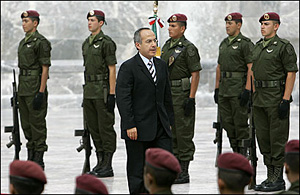 |
 |
 |
 Editorials | At Issue | September 2006 Editorials | At Issue | September 2006  
New Mexican Leader's Aims Unclear
 Jo Tuckman - Boston Globe Jo Tuckman - Boston Globe


| | The Mexican president-elect, Felipe Calderón, passed by an honor guard yesterday in Mexico City. Calderón says he wants to stitch together left and right after a divisive election. (Eduardo Verdugo/ Associated Press) |
Since being declared president-elect a week ago, Felipe Calderón, the conservative leader of the governing National Action Party, is spreading a message of conciliation and tolerance as he confronts a charismatic leftist opponent who insists that the election was rigged and who refuses to concede defeat.

But analysts say it is not yet clear how committed Calderón is to reaching out to supporters of his opponent, Andrés Manuel López Obrador, and some say his options are limited by hard-liners in his own party.

The conservative has pledged to make the battle against poverty his "first priority," taking up the mantel of López Obrador's campaign, which championed the needs of the country's downtrodden.

But most analysts agree that the target of Calderón's message is less López Obrador and his supporters as it is those who believe the leftist was cheated of victory, but who also disapprove of his radical tactics.

Many also see this as a strategy to appease moderates within his Democratic Revolution Party, the PRD, which won unprecedented representation in the legislative elections that coincided with the presidential polling on July 2. The PRD is threatening to spoil Calderón's congressional swearing-in ceremony on Dec. 1, just as it blocked President Vicente Fox's last state-of-the-nation address on Sept. 1.

Calderón's overall aim, said José Antonio Crespo, a prominent analyst from the think tank known as CIDE, or Presupuesto-CIDE, is to "hold out his hand and wait for moderates to start a dialogue."

But analysts question how dedicated Calderón is to this approach.

"He has to sound conciliatory at the moment," Crespo added. "But my sense is that he is rather isolated and has little room for maneuver to make the promises effective."

Crespo cited Manuel Espino, the president of Calderón's party, the National Action Party, or PAN, who has already put his people in the key positions of party bloc leader in both houses of the legislature.

Espino, many observers say, would like to press on with PAN's own agenda of seeking growth through free-market reforms, rather than expend energy by trying to co-opt the official losers of the election, who do not want to negotiate anyway.

But for Federico Estevez, a political analyst from the ITAM think tank who knows PAN well, Calderón is more his own man than some give him credit for. The future remains cloudy, the analyst said, probably because the president-elect is still deliberating about what to do.

"There is clearly a division in his team," Estevez said. "I cannot tell what Calderón's preference is."

Estevez added that much depends on how long the victorious candidate is prepared to "carry on turning the other cheek" to the challenges posed by López Obrador. And the message that Calderón will not shy away from using force to exert his authority is present in his speeches, in between the calls for reconciliation.

"Mexicans want a government to govern with prudence," Calderón said Sunday at a victory celebration in Mexico City's bull ring, adding: "And with a firm hand."

Searching for clues regarding his future moves, many observers are turning to the 44-year-old Calderón's political biography.

Born into a middle-class family in central Mexico, Calderón attended his first political meetings in his mother's womb while his father campaigned for PAN. At the time, the party was the loudest dissident voice against the Institutional Revolutionary Party, which governed Mexico from 1929 until 2000. By age 12, Calderón was reputedly telling his history teacher that he wanted to be president, as he spent his spare time handing out leaflets for PAN and was making up long political speeches to recite at the supper table.

By 30, Calderón was a member of Congress, chairman of the party at 34. After a spell at Harvard's Kennedy School of Government in 1999, Calderón became energy minister, leaving the Cabinet after only a few months, following a row with Fox over his presidential ambitions.

Having won the party primaries by beating Fox's favored candidate, then Interior Minister Santiago Creel, Calderón kicked off his presidential campaign 10 points behind López Obrador.

Few thought he could close the gap; he nevertheless did with the help of an extremely negative campaign against his rival.

Some, such as former foreign minister and well-known academic Jorge Castańeda, saw in this tale the making of a "tenacious politician" who may persevere with enough energy to find a peaceful way out of the current crisis.

"He may be successful, but it is also very possible that he will not," Castaneda said, adding that this depends more on the willingness of the opposition to play ball than on Calderón's abilities.

Others, such as Crespo from CIDE, are less impressed with Calderón's political skills and determination. "What he has done is not to be sneered at," Crespo said. "But it simply does not compare to the challenge he faces today, not by a long shot." | 
 | |
 |



